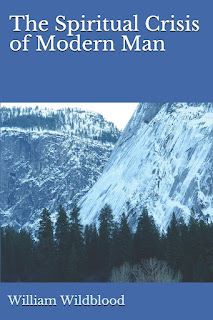I have a good deal of sympathy for serious seekers who wish to explore spiritual traditions of the past because they see these as unaffected by the plagues of modernity to which all religions which have made it into the 21st century have succumbed. Christ is universal and his person and teaching encompass and override everything else but certain things were undoubtedly lost in official Christianity. God was removed to a far distance, the world became dead matter, the gods were demonised which means Nature lost her sacred qualities, and the universal supplanted the local with spiritually sterilising results. To a certain extent, an involvement with paganism can restore these losses.
But only to a certain extent. The difficulty here is we are modern people living in the modern world with modern consciousness and needing to learn lessons associated with all those things. We are not our ancestors and not meant to return to their way of life and mode of being even though we have lost many good things of those times and to our great detriment. We should certainly be aware of that loss and try to restore it but we have to do so in a way that is natural to us, that becomes us, and ancient pagan rites, rituals and beliefs will always be like a suit of clothes we have borrowed that do not really fit us. Furthermore, the spiritual approach of the pagan path lacks something that makes Christianity uniquely powerful. Paganism has its gods who may still exist in some form (either angelic or demonic) on the inner planes and who may also have lived in the physical world in pre-history, but it does not have the incarnation of God. There is no spiritual figure in any religion other than Christianity who manifested perfection, no Odin, no Zeus, no Apollo, no Athene, no Isis etc begins to do this, and this matters because the religious exemplar determines the mindset of the followers. This is not to say Christians are better people than those of other religious backgrounds, but the pattern to which they seek to conform themselves is on a higher plane of reality. It is the true and original template of truth compared to which all others are only approximations at one or several removes.
In the standard Christian view, God and creation are separate which means that we, as part of creation, can only achieve divine union through grace. The pagan approach is to see the world as an emanation of the divine which gives it a sacred quality often lacking in the ex nihilo scenario. However, there is an important strand in Christian mysticism summed up in the saying of Meister Eckhart that there is something uncreated in the human soul which we may take to refer to the spark of divine being that is the source of our life. Without this always-present spark of divine being an eventual union would not be possible. To be created in the image of God carries the same meaning as does the idea that we are the sons and daughters of God. The child is born from the seed of the Father and that is the spirit within us. This does not mean that we already are God because the spark is in the soul, it is not the soul itself, which means that the created part, the soul, has to transcend itself to know its real and eternal nature as divine, and that is the goal of all spiritual life. This scenario satisfies both the need for grace and the doctrine that God already exists within us as our innermost being so it takes the pagan idea of divine immanence up to a Christian level where it can be properly sanctified,
Creation may be ex nihilo but that only means there is no pre-existing stuff out of which God creates. It does not preclude the possibility that he creates out of himself, and that idea would resolve the conflict between the creationist and emanationist schemata. Pagans might reject Christianity because they see it as removing God from the world and even from the soul but they, in turn, miss that both the world and the soul are in their present state fallen, and that deep wound can only be healed by and in Christ.



